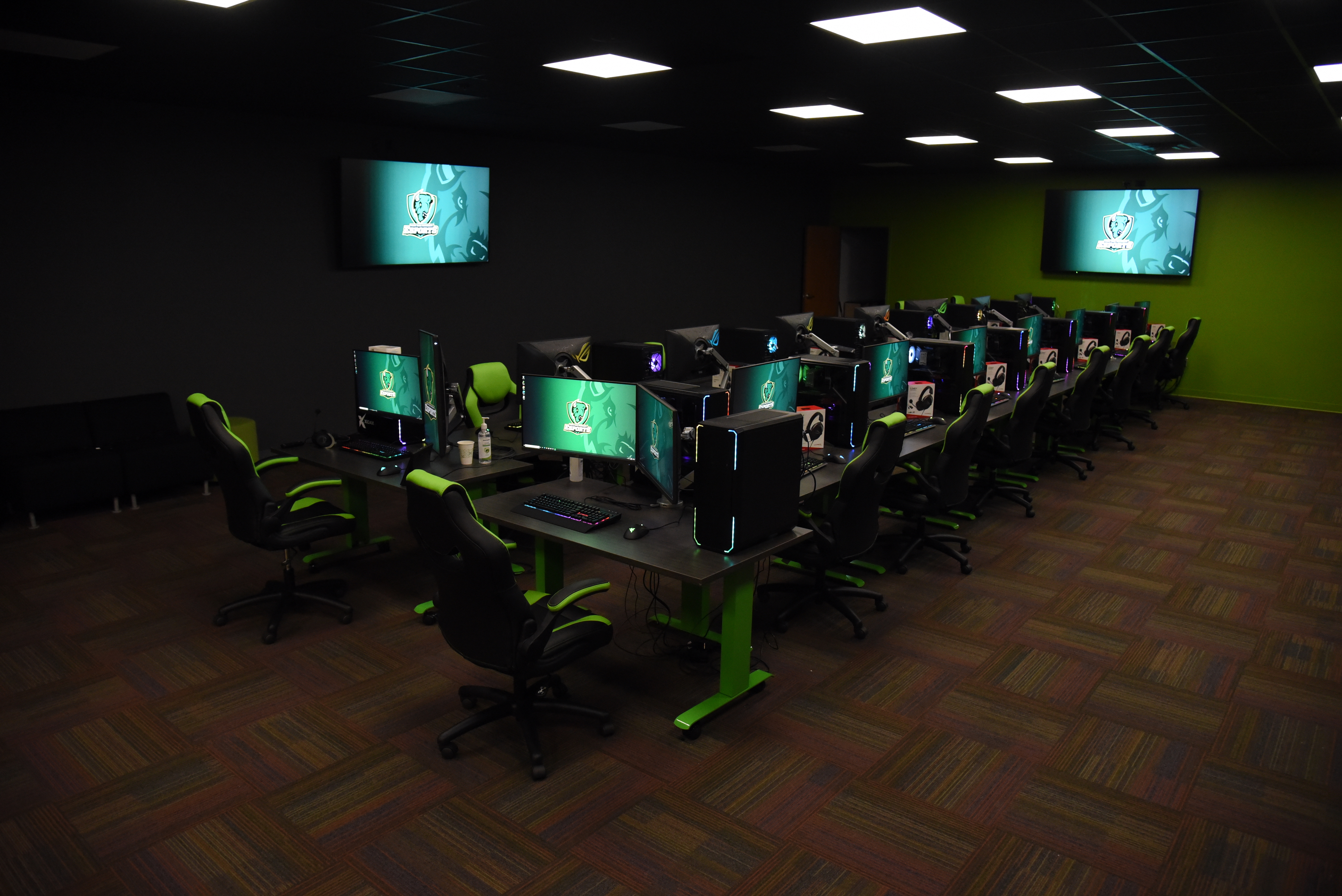Game On at Point Park University
Athletics has always been a major part of campus life at Point Park University in Pittsburgh, but this year the school upped the ante, diversifying its existing athletics program with the addition of its first esports training facility.

A daily selection of features, industry news, and analysis for AV/IT professionals. Sign up below.
You are now subscribed
Your newsletter sign-up was successful
Athletics has always been a major part of campus life at Point Park University in Pittsburgh, but this year the school upped the ante, diversifying its existing athletics program with the addition of its first-ever esports training facility.
The aim was to build a varsity team that would train to compete in the National Association of Collegiate Esports Rocket League Fall Season and League of Legends, but would also receive the benefit of a solid education in matters related to esports, AV technology and computer networking.
“The most important objectives for us were centered around building a facility that supported the learning and growing of the students and program. We really wanted to build a space that fit the needs of both the coaches and the students for practice and competitions,” explained Chris Gaul, head coach of varsity esports at Point Park University.
[The Integration Guide to Esports]
“Additionally, we wanted the facility to be used as a showpiece and a recruiting tool for the esports program and university as a whole. Having a solid center for any program is exceptionally important,” he added.
Learning by Design
Alongside enabling competitive gaming, the esports training arena had to facilitate hands-on education for students enrolled in the program. The curriculum brings students behind the scenes to learn about back-of-house processes and supporting technologies in a pro environment—from AV streaming and casting to event planning, graphic design, and videography.
Faculty members overseeing the esports program wanted a seamless yet simple educational setup that could enhance student learning.
A daily selection of the top stories for AV integrators, resellers and consultants. Sign up below.
To get the project rolling, the university’s physical plant remodeled a former yoga/Pilates studio to suit the project’s requirements. The media services and IT departments collaborated to deploy a new high-speed data network and incorporate multimedia lines within the 1,450-square-foot room.

Local integrator RPC Video was then called in to carry out a full design and install of a high-performance AV system for the esports facility. To provide the kind of system performance required for competitive gaming, the design team opted for Extron XTP Systems, along with an SMP 111 streaming media processor and Pro Series control products.
Steve Obenreder, sales manager at RPC Video, recounted some of the most pressing design considerations on the project. “We had to reuse an existing space, a former aerobics exercise studio. This room was open, but the ceiling height was 8 feet or so. We knew we needed a wide-bandwidth signal path as the basis of this design. We first looked to AVoIP as the solution, but that didn’t allow us the backplane bandwidth we needed. Extron was an excellent partner in outlining their approach to signal routing and bandwidth, and the XTP system they suggested is just what we needed.”
Using the XTP system, RPC was able to achieve wide-bandwidth signals within the system. Further, there were outputs available to send signals to other future locations—either directly or over fiber at higher data rates, or using NAV AVoIP to move signals around campus.
Creative Approach
“After further discussions with Extron, we realized that the NAV AVoIP approach would not allow the bandwidth needed at the system core. Extron came up with some very creative ways to redesign the system using XTP to give us that signal core,” said Obenreder.
A custom-configured Extron XTP II 3200, 10-inch TouchLink Pro control surface, HD Pro hybrid fiber cables, SMP 111 streaming processor, IPCP control processor, DSC scalers, HDMI Ultra cable, and accessories comprise the core of the signal path. Digital signage and gameplay presentation in the room are handled by 75- and 86-inch Panasonic EQ Series displays.
“RPC has put many Panasonic displays out in real-world signage applications over the last several years, and we have had great results with them. Like Extron, Panasonic has been a helpful partner, and along with a great product, that relationship makes project work that much easier,” added Obenreder.
The esports training room houses 16 gaming stations, each with a custom Intel Core i7 10700K 8C/16T 5.1 GHz processor and 144 Hz Asus ROG Strix XG279Q 27-inch HDR gaming monitor. The Extron XTP II CrossPoint 3200 modular matrix switcher with 50 Gbps digital backplane provides instantaneous switching for the gaming station feeds.
Using this setup, coaches, team members, and local spectators are able to watch the action take place at any gaming station on displays that are mounted on the left, right, and center walls. Additional displays include 24-inch monitors at the instructor station as well as in the adjacent equipment room that houses the AV switching system.
Chief Fusion series wall mounts secure the displays, as well as AtlasIED Strategy series speakers in black to blend with the dark ceiling. A compact Middle Atlantic ERK rack for equipment and a Juice Goose SBN series UPS serves up efficient power control.
“Chief and Middle Atlantic are no strangers to maximizing utility in unique spaces. Our engineers are driven by this kind of innovation, and it’s exciting to see our solutions come to life at the intersection of esports and AV,” said Karen Smidt, director of product marketing at Legrand AV, parent company of the Chief and Middle Atlantic brands.
“The system at its core is common: a matrix routing frame with a very good selection of copper and fiber I/O cards,” added Obenreder. “The main challenges were centered around budget and space. The main space for competitions was sufficient, but the equipment room was shared with the team as a storage and small staging area, so fitting there was a bit of a challenge.”
As with many projects of this nature, time was also a factor. “Extron delivered all the specified equipment in the timeliest way, and we did as much of the installation as possible: wire installations, display mounts up, ceiling speakers installed, XTP system pre-programmed, and so on. But, the gaming computers and monitors were a little slow in arriving,” he said.
They did arrive, though, and the RPC Technical Service team went back in and finalized the system, tested it, and trained the new esports coach. “The system is in use, and the team has already been involved in competitions,” said Obenreder.
Full System Control
For the coach, the TLP Pro 1025T TouchLink Pro touchpanel installed at the instructor station ensures control across a variety of AV system operations.
The touchpanel works with two rack-mounted IP Link Pro control processors to manage all of the major components in the system. Three AV LAN ports on the Extron IPCP Pro 360 processor allow control of the equipment while safeguarding against potential intrusion or interference, while the IPL Pro S3 processor enables control of the observation displays over the university network. The processors also provide application controls, such as AV system and device power, audio level adjustment, and streaming/recording controls.
Using the Extron SMP 111 recording and streaming media processor meant matches could also easily be captured, distributed, and streamed to online platforms like Twitch and YouTube.
“The final system design fulfilled the needs of our student athletes because it allowed the coach to coordinate seamless and efficient practices. The facility was designed to be a tool—not only for the coach, but for the teams to improve unimpeded. It does that exceptionally well,” said Gaul.
With the rapid global rise of esports courses and varsity gaming programs across higher education, particularly in the United States, Point Park has no doubt cemented a much more competitive learning environment for its students, who can now capitalize on this trend.
Ledetta Asfa-Wossen is an education, technology, and business journalist.
